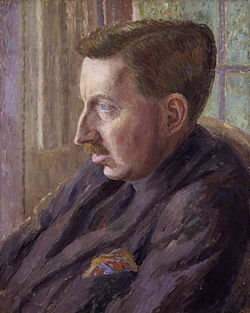E.M. Forster Quote
People turned out to be alive. Hitherto he had supposed that they were what he pretended to be — flat pieces of cardboard stamped with a conventional design — but as he strolled about the courts at night and saw through the windows some men singing and others arguing and others at their books, there came by no process of reason a conviction that they were human beings with feelings akin to his own. He had never lived frankly since Mr Abrahams's school, and despite Dr Barry did not mean to begin; but he saw that while deceiving others he had been deceived, and mistaken them for the empty creatures he wanted them to think he was. No, they too had insides. But, O Lord, not such an inside as mine.
People turned out to be alive. Hitherto he had supposed that they were what he pretended to be — flat pieces of cardboard stamped with a conventional design — but as he strolled about the courts at night and saw through the windows some men singing and others arguing and others at their books, there came by no process of reason a conviction that they were human beings with feelings akin to his own. He had never lived frankly since Mr Abrahams's school, and despite Dr Barry did not mean to begin; but he saw that while deceiving others he had been deceived, and mistaken them for the empty creatures he wanted them to think he was. No, they too had insides. But, O Lord, not such an inside as mine.
Related Quotes
She was a gypsy, as soon as you unravelled the many layers to her wild spirit she was on her next quest to discover her magic. She was relentless like that, the woman didn't need no body but an open r...
I have outgrown so much, I think at some point we all do ~ we reach a stage in our life where we are forced to make a change, forced to cut friendships, relationships, jobs and places we once called h...
About E.M. Forster
Considered one of the most successful of the Edwardian era English novelists, he was nominated for the Nobel Prize in Literature in 22 separate years. He declined a knighthood in 1949, though he received the Order of Merit upon his 90th birthday. Forster was made a Member of the Order of the Companions of Honour in 1953, and in 1961 he was one of the first five authors named as a Companion of Literature by the Royal Society of Literature.
After attending Tonbridge School, Forster studied history and classics at King's College, Cambridge, where he met fellow future writers such as Lytton Strachey and Leonard Woolf. He then travelled throughout Europe before publishing his first novel, Where Angels Fear to Tread, in 1905. The last of his novels to be published, Maurice, is a tale of homosexual love in early 20th-century England. While completed in 1914, the novel was not published until 1971, the year after his death.
Many of his novels were posthumously adapted for cinema, including Merchant Ivory Productions of A Room with a View (1985), Maurice (1987) and Howards End (1992), critically acclaimed period dramas which featured lavish sets and esteemed British actors, including Helena Bonham Carter, Daniel Day-Lewis, Hugh Grant, Anthony Hopkins and Emma Thompson. Director David Lean filmed another well-received adaptation, A Passage to India, in 1984.
